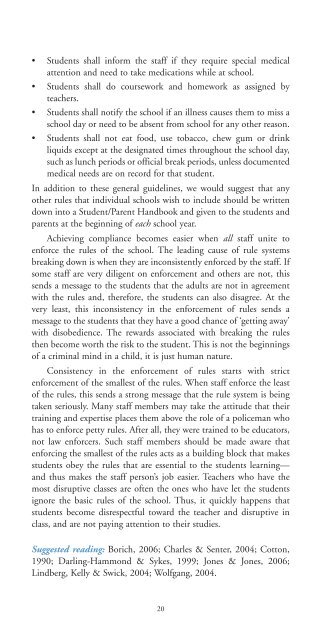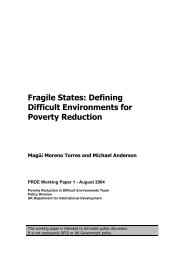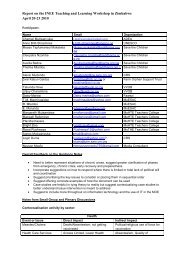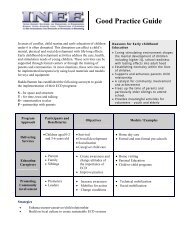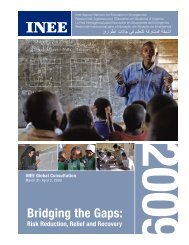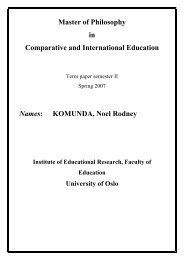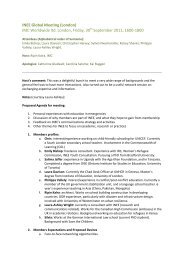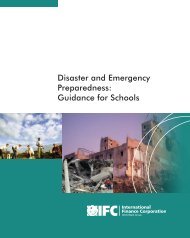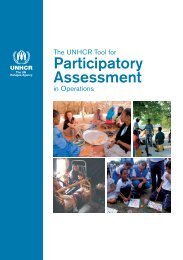Creating a safe and welcoming school - INEE Toolkit
Creating a safe and welcoming school - INEE Toolkit
Creating a safe and welcoming school - INEE Toolkit
- No tags were found...
Create successful ePaper yourself
Turn your PDF publications into a flip-book with our unique Google optimized e-Paper software.
• Students shall inform the staff if they require special medicalattention <strong>and</strong> need to take medications while at <strong>school</strong>.• Students shall do coursework <strong>and</strong> homework as assigned byteachers.• Students shall notify the <strong>school</strong> if an illness causes them to miss a<strong>school</strong> day or need to be absent from <strong>school</strong> for any other reason.• Students shall not eat food, use tobacco, chew gum or drinkliquids except at the designated times throughout the <strong>school</strong> day,such as lunch periods or official break periods, unless documentedmedical needs are on record for that student.In addition to these general guidelines, we would suggest that anyother rules that individual <strong>school</strong>s wish to include should be writtendown into a Student/Parent H<strong>and</strong>book <strong>and</strong> given to the students <strong>and</strong>parents at the beginning of each <strong>school</strong> year.Achieving compliance becomes easier when all staff unite toenforce the rules of the <strong>school</strong>. The leading cause of rule systemsbreaking down is when they are inconsistently enforced by the staff. Ifsome staff are very diligent on enforcement <strong>and</strong> others are not, thissends a message to the students that the adults are not in agreementwith the rules <strong>and</strong>, therefore, the students can also disagree. At thevery least, this inconsistency in the enforcement of rules sends amessage to the students that they have a good chance of ‘getting away’with disobedience. The rewards associated with breaking the rulesthen become worth the risk to the student. This is not the beginningsof a criminal mind in a child, it is just human nature.Consistency in the enforcement of rules starts with strictenforcement of the smallest of the rules. When staff enforce the leastof the rules, this sends a strong message that the rule system is beingtaken seriously. Many staff members may take the attitude that theirtraining <strong>and</strong> expertise places them above the role of a policeman whohas to enforce petty rules. After all, they were trained to be educators,not law enforcers. Such staff members should be made aware thatenforcing the smallest of the rules acts as a building block that makesstudents obey the rules that are essential to the students learning—<strong>and</strong> thus makes the staff person’s job easier. Teachers who have themost disruptive classes are often the ones who have let the studentsignore the basic rules of the <strong>school</strong>. Thus, it quickly happens thatstudents become disrespectful toward the teacher <strong>and</strong> disruptive inclass, <strong>and</strong> are not paying attention to their studies.Suggested reading: Borich, 2006; Charles & Senter, 2004; Cotton,1990; Darling-Hammond & Sykes, 1999; Jones & Jones, 2006;Lindberg, Kelly & Swick, 2004; Wolfgang, 2004.20


